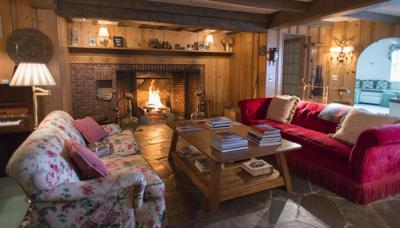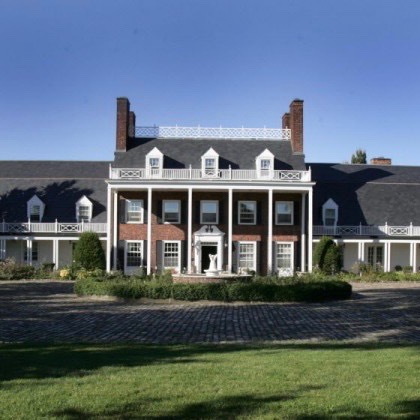HUNTING VALLEY— Sylvia Korey, owner of the historic 55,000-square-foot mansion known as Roundwood Manor in the Daisy Hill neighborhood, is continuing to push forward in her effort to save her home. Even though the house was named to the National Register of Historic Places in December, it is still vulnerable to demolition.
Though on the market for 17 years, Ms. Korey has had no viable offers. She presented a plan to convert the mansion into six luxury condominiums, but the Hunting Valley Planning and Zoning Commission denied the request for a special-use permit. The commission said that Ms. Korey’s 7.69-acre property is not large enough to meet the village’s 5 acre per residence requirement, which would require 30 acres for six condos. She filed a civil lawsuit against Hunting Valley in May, stating that the only two options are the condo plan or demolition.
President of the Cleveland Restoration Society Kathleen Crowler said that joining the National Register of Historic Places is the highest test of acknowledging a landmark. But, she said, it is honorific, meaning that the designation does not provide legal protection from demolition.
“If someone wants to tear it down using private funds, they can,” Ms. Crowler said. “Hunting Valley needs to be flexible with its rules in this instance or the landmark will be lost.”
The National Register of Historic Places acknowledges properties for their historical significance. Roundwood Manor was named to the list because of its famous developers and architect, Oris and Mantis Van Sweringen and Philip Small, respectively. The home was also recognized for its excellent display of colonial architectural revival style, according to the Cleveland Restoration Society.
Condos and zoning conflict
While there are several other multifamily dwellings in Hunting Valley, they all meet the 5 acres per residence requirement.
Service Director Don Cunningham said that Clanonderry, a three-residence dwelling in Daisy Hill, used to serve as stables and was converted into a residential property. Clandonderry only needs 15 acres to meet the Hunting Valley requirement, and the estate sits on 20 acres.
Hunting Hill Farm Drive on Chagrin River Road is comprised of three condos connected in a U-shape on the property. It sits on 30 acres when only 15 are required for the property.
“There is nowhere in the village that has multiple units that are not on adequate acreage to support the 5 acre minimum per unit,” he said.
The condo plan is the only option that Ms. Korey has left, she said, because ordinances prohibit her from renting the house or selling it to a commercial enterprise. Ms. Korey said that she has heard from people who would be interested in living in the condos if the plan was approved.
“I’m asking them (the commission) to make an exception for an exceptional house,” she said.
Another Daisy Hill resident, Karen Doll, said that she supports the condo plan.
“I think if it came to the worst of tearing the house down, it would be a heartbreaking outcome,” she said. “I don’t think it (converting the home to condos) will impact property values at all.”
Hunting Valley Councilman Bill O’Neill has shown consistent support for Ms. Korey’s condo plan. He said that Roundwood Manor is a special place and plays a unique role in northeast Ohio and in the village.
“The condo plan would preserve the building and it would offer new types of living facilities for people who want to downsize but still live in Hunting Valley,” he said. “I have urged Hunting Valley to find a way to move forward with the plan.”
Ms. Korey said that it would be easy to separate Roundwood Manor into an east, west and north wing since the house is shaped like a “T.” Cleveland historian Dan Ruminski also said that he supports the plan as it would make minimal interior changes to the mansion, and compared the plan to saving the Drury and Mather mansions downtown.
According to Cuyahoga County Common Pleas Court records, Ms. Korey has two filings against the village. On May 2, Ms. Korey filed a declaratory judgment, in which she is asking for a declaration that the village’s zoning code is unconstitutional, according to Hunting Valley Law Director Steve Byron. Nearly a week later, Ms. Korey filed an administrative appeal against the planning and zoning commission, which appeals the commission’s denial of her request for a special-use permit.
There is a settlement conference scheduled for May 7, 2019 for the declaratory judgment, according to court records.
“Courts often try to get parties together to try to reach common ground,” Mr. Byron said.
Regarding the administrative appeal, Ms. Korey was granted permission in November to introduce additional evidence, and the defendant asked for reconsideration. Mr. Byron estimated that the appellee and appellate briefs would be completed in February. He said that the village will consider any proposal that is made.
“They have a process to follow depending on what the proposal is,” he said.
“While we were talking to the village, I was always hopeful for a positive outcome for Roundwood Manor,” Ms. Korey said. “Moving forward with legal action was a difficult decision, but I remain committed to saving this house.”
“The best way to preserve the house is luxury condos,” said Ms. Korey’s attorney, Bruce Rinker of Mansour Gavin, LPA. “The village has the pathway to that through a special-use permit.”
Ms. Korey plans to continue pursuing the condo plan to save her historic home.


